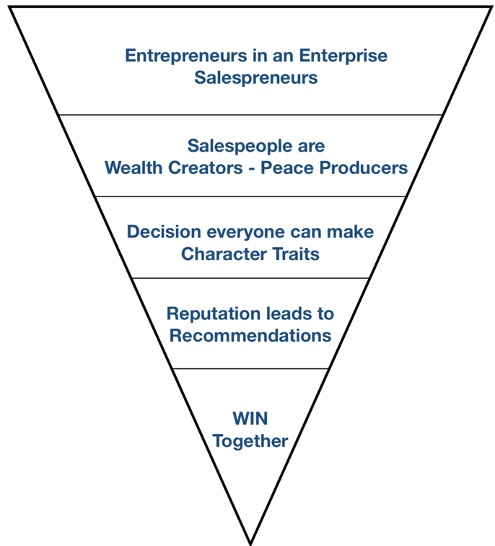Danish theologian Soren Kierkegard wrote, “Life can only be understood backwards, but it must be lived forwards.”
Age-old characteristics and principles are involved if sales is to be successful. If we take a trip back in time, rediscover these principles, then carry them forward into today’s application, we see that they benefit not only sales and commerce but all of society.
For many years I have pointed out that salespeople are very similar to entrepreneurs. I have therefore referred to them as “entrepreneurs within the enterpriseEnterprise Enterprise (in the context of sales) is a relatively large organization typically composed of multiple levels, locations, and departments which need multi-layer software systems that support collaboration across a large corporate environment.,” or in a word I coined, salespreneurs. In order to create stable commerce and, in fact, society, we need salespreneurs.
Taking a close look at the actual activities of salespeople, we can see that they are creating wealth and producing peace, which we’ll illustrate in more detail as we go in this article. How do they perform these missions? They interact with customers, build real connections, and exhibit certain vital character traits.
Why is it that salespreneurs should behave in this way? Because of their understanding that we all thrive together in this world only when we all win together. When salespeople and their customers win together, salespeople earn recommendations, which are today’s currency of a networked society. Finally, if all of this is conducted with an altruistic approach, we will win even more together, as we will see further in this article.
How are salespeople assisted in this age-old yet contemporary mission? By Pipeliner CRM. Pipeliner is a CRM productProduct Product refers to anything (an idea, item, service, process or information) that meets a need or a desire and is offered to a market, usually but not always at a price. without equal. Besides being an intelligent, flexible and robust CRM sales automationSales Automation Sales Automation is the act, practice or technique of using software to simplify, speed up or streamline the entire sales process or specific component activities such as customer tracking, forecasting, and inventory monitoring. tool, it is accompanied by powerful theory for salespeople. Together, the tool and the theory make for a unique dynamic combination offered by no other CRM vendor. This theory includes a unique sales approach that salespeople should adopt to succeed in the long term.
A Historical Perspective
You’ll find that any society is bound together by economics. Economics, of course, has everything to do with sales. For that reason, salespeople have profoundly affected society since ancient times.
In ancient times, economics consisted of trade. Trade began with the decision to exchange something with someone else for mutual benefit. That mutual benefit came from perceived equality in the value of various goods or services to be exchanged.
As trade progressed there had to be agreement on the value of traded goods, so there would be agreement on how much of one thing something else was worth. There had to be a degree of equality for both sides—otherwise, one side or the other would feel betrayed. Both sides needed to profit.
So that buyers would not be cheated, regulations were evolved. We find evidence of these all the way back in ancient literature. In the Bible’s book of Proverbs, chapter 20, verse 10, it is written that merchants were not allowed to use different weights and measures for trade. Weights and measures had to be accurate and mutually agreed upon.
But it was clear that buyers could be corrupt, too. A few verses later in the same book and chapter of Proverbs, a warning is issued about buyers who would loudly complain about a transaction to the merchant so that the merchant would lower the price. The buyerBuyer A buyer is an individual or organizational entity that purchases a product or subscribes to a service. would leave and then boast loudly to their cohorts about how they had unfairly cheated to drive down the price.
Both Sides Must Win
In my opinion, any transaction needs to provide benefit to both buyer and seller. If one side benefits considerably more than the other, there is a mismatch, and one side feels cheated.
It was posited by 16th-century essayist Michel de Montaigne that only one side could win in trade, while the other lost. He has been heavily criticized for this view, but his words can certainly be seen to be valid looking at the international commerce of his day. In our present world, we hear constant complaints, all across the globe, about being charged inflated prices for goods and services.
Meanings in Professions
Let’s now examine what might be the meaning of a salesperson.
There are professions in which meaning is almost automatically intrinsic. An example I’ve brought up in the past is the firefighter, who has the meaning of saving lives and property.
What benefit or power does meaning provide to a profession? It provides the drive and energy to the person far beyond the money earned, and has a positive connotation within society. Meaning motivates someone to learn the profession, which isn’t always easy—just ask any firefighter.
There are professions for which meaning seems to have been lost. For example, law enforcement—some want to de-fund them and even get rid of them. Thanks to COVID, many people aren’t sure if the health industry even has a meaning. And much of journalism, a field that once had a great deal of meaning, seems to have wholly lost its search for objective truth in the quest to sell advertising.
Meaning for Salespeople
We have a foundational mission at Pipeliner to return to sales a core meaning. Why? Because we feel passionately that sales has the same cultural importance as firefighters or any other equally important profession.
We begin by informing salespeople that they create incredible value by performing their jobs correctly—by not cheating and adhering to an age-old code of ethics that have always been part of commerce.
The Austrian School of Economics teaches us that salespeople actually create the conditions for peace, because entities engaged in trade cannot simultaneously be in conflict or at war. As Frederic Bastiat stated, “When goods don’t cross borders, soldiers will.” I have always defined salespeople as creators of wealth and producers of peace, because of the Austrian School of Economics principle that trade has a peacekeeping component. When you view salespeople this way, their critical importance to society becomes obvious.
Coming down from these lofty concepts, let’s just take the practical view that society is composed of consumers. The more we consume, the more we need salespeople. This is true, of course, for B2BB2B B2B is an acronym for Business-to-Business, a model for selling, relationship-building, or engagement. sales, but is also true for B2CB2C B2C is an acronym for Business-to-Consumer, a model for selling, relationship-building, or engagement. sales—as an example, go to your nearest Apple store and see how many salespeople are employed there.
It becomes obvious, then, that the sales profession certainly has a real meaning, far beyond just that of making a comfortable living. I want to stress this point even more because the media and popular culture has, in the last century, created a very negative view of salespeople and negative connotations about the profession itself. We therefore need to reestablish the importance of this workforce again, and underscore the critical role they can play in creating a more stable society.
The Exchange Through Society
Salespeople, through their activities, involve themselves in real and consistent exchange. As pointed out above, this exchange offers an alternative to the violence we see all around us. The economists of the Austrian School of Economics have always emphasized the great importance of exchange for a society.
A very interesting principle found in the Austrian School is called the law of comparative advantage. It states that exchange can benefit all involved, even when some parties are superior to everyone else. For that reason, the law of comparative advantage is also called the law of socialization. This is not to be confused with nationalization—rather it is peaceful coexistence of people who are strangers to each other. Don’t we need this more than ever today, not just for each other, but for each nation and culture?
A new word was even proposed to replace “economics” by Austrian economist Friedrich von Hayek: Catallactics. The word was originally coined by English economist Richard Whately, and is based on a beautiful Greek word katallattein, which means both “to exchange” and “to turn from enemy to friend.” This quality is something we observed in the 2022 World Cup being held in Qatar. Competitors from all over the world were housed right next to each other and celebrated a friendly rivalry together. It is clear that people innately want to be friends and not enemies, and certainly not in conflict.
Character Traits Comprising Meaning
Today a salesperson operates within a networked society. Because of this, the salespeople’s meaning becomes more important than many other professions that are more “behind the scenes.” Although, when we go to a hospital, for example, do we not expect staff to behave according to their professional standards? We expect doctors and nurses to treat us with empathy and compassion.
What does the buyer expect when engaged with a salesperson? That they find a deal in which both sides win. This concept has become twisted over the years, so we are bringing it back. This meaning for salespeople, in many ways, boils down to character traits such as integrity and truth, so that a prospect knows the salesperson is not trying to take advantage of them. Another trait is patience, not letting your anxiety to close the deal cause you to lose your temper and blow it. Loyalty and honesty are other aspects, so a prospect knows they can trust the salesperson. Deals were long ago made simply by a handshake—and that same quality of trust must still exist.
Wherever people are involved with other people, especially when it comes to sales, the full list of traits they need to possess are:
- Faithfulness—which means that salespeople are eternally faithful to the product
they’re selling, and to the profession of sales. - Generosity—the salesperson needs to be generous with the time they invest in order to get something out of a deal.
- Honesty—the salesperson should be honest in their approach, not selling something that, when the customerCustomer Customer is an individual or an organization that purchases a product or signs up for a service offered by a business. arrives home, they find is defective.
- Integrity—the salesperson should keep their word, and not unexpectedly alter any aspects of the sale.
- Loyalty—the salesperson is loyal to the deal, but also loyal to the company.
- Leadership—the salesperson shows leadership in moving the deal forward.
- Patience—the salesperson is patient and not “pushing” the customer to close.
- Peacefulness—the salesperson doesn’t try to force any issue.
- Self-control—the salesperson isn’t falling apart when there are issues with the deal, or when the customer tries to talk down the price.
- Teachable—the salesperson is capable of learning all about their products, their market and their customers.
The above traits not only comprise meaning for the sales profession, but in fact define you as an individual. On a broader level, bringing these traits to the table or returning to them makes for a more stable society.
Utilizing Old Principles Today
There are factors found in commerce today that were identical thousands of years back. For example, today we see that the buyer and the seller are somewhat in competition, each striving for a win..
One very significant difference is the speed of communication. In ancient times, news traveled by word-of-mouth, making its way on camel or horseback, and no one had any idea of what was happening even 500 miles away. Today, however, news is instant, traveling the entire globe in milliseconds.
Within the networked society in which we live, a salesperson’s reputation precedes them. It is, therefore, even more important than ever that sales traits and principles that have been with us since ancient times be applied today. Today’s sales currency consists of recommendations, and these happen by word-of-mouth. Given the plethora of review sites, networking sites, community sites, word-of-mouth can scale like never before.
Additionally, in life, it can happen that you meet someone twice. “Meeting” in today’s networked world can happen instantaneously, and given our interconnection, the chances of meeting that person again are greatly increased. You should therefore strive to make a great impression, every time.
Today an unprecedented amount of information is available to buyers, about both the seller’s and the seller’s competitor’s products. This means that the seller has to work even harder to create value at every stage of the buying process to differentiate themselves. Again, this requires building rapport and trust.
Traits are Inherent
A fantastic aspect of these traits is that they are inherent in everyone—we just have to activate them. Each of us has the innate capacity to utilize that entire list of qualities above. And from these qualities comes meaning.
These traits don’t require sales techniques or training. In fact, many sales techniques leadLead Lead refers to a prospect or potential customer (who can be an individual or organization) that exhibits interest in your service or product; or any additional information about such entity. to turning salespeople into robots, like AI. An increasing amount of technology is attempting to “automate” a salesperson. Every call is monitored, and wording is corrected. This trend leads to a total loss of authenticity, which prospects and customers don’t like.
No, we once again need to revert to acting as real humans. True and effective sales are built on relationships—the bridge from one person to the other.
These inherent traits simply require the basic decision to put them to use. It is up to the individual to decide to become the person who displays such traits.
Combining CRM and Theory
We utilize a very unique approach at Pipeliner—we combine our state-of-the-art CRM system with deep and relevant theory. This means a salesperson is both armed with a fantastic toolset and substantial wisdom to apply it.
Why do we invest the time and effort into this approach? Because, as we said above, salespeople have a direct impact on society and positively contribute to it, just as firefighters, medical professionals, legal professionals, and many more do.
Comparing sales to other professions, sales has as its primary goal “winning together.” Why should we win together? Because in a sales environment, all actions are, in the end, carried out for the well-being of others—and sometimes at risk to salespeople themselves without expecting anything in return. This is a truly altruistic approach.
The above approach, when all is said and done, is the culmination of sales. This is because we know that in contributing to the well-being of others, in the end, we help ourselves too.
Summing Up With a New Sales FunnelSales Funnel Sales Funnel is a visualization of the sales process that defines the stages through which prospective customers go through as they are led by sales professionals towards a purchasing decision.

“Entrepreneurs in the enterprise” is how we describe salespeople. Or, put more simply, salespreneurs.
Wealth and, as a byproduct, peace, are produced by salespeople.
These missions are accomplished by salespeople through demonstration of the above character traits. The salesperson makes the firm decision to be someone who lives these qualities.
Everything is about reputation in a networked society. What is your name? Who are you? This is why we distrust politicians; they are not truthful, and we hate it.
Recommendations are the currency of reputation in a networked society.
At the end of the day, all of these factors funnel down to winning together. Why? Because the price of the well-being of others is that sometimes we take the risk of providing something without expecting anything in return. Our contribution to the well-being of others is also a contribution to our own well-being, because it is rooted in altruism.
Start Your Free, No-Obligation 14-Day Pipeliner CRM Cloud Unlimited Trial!





